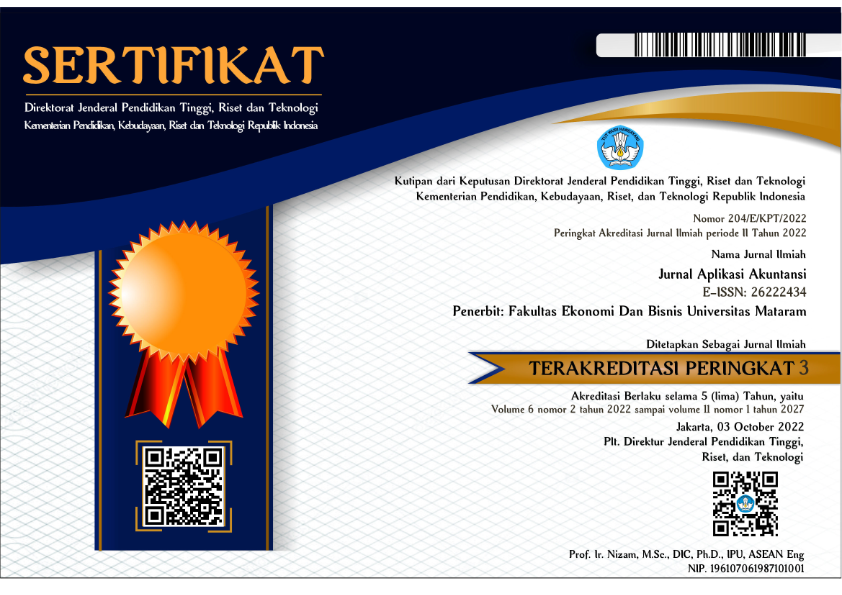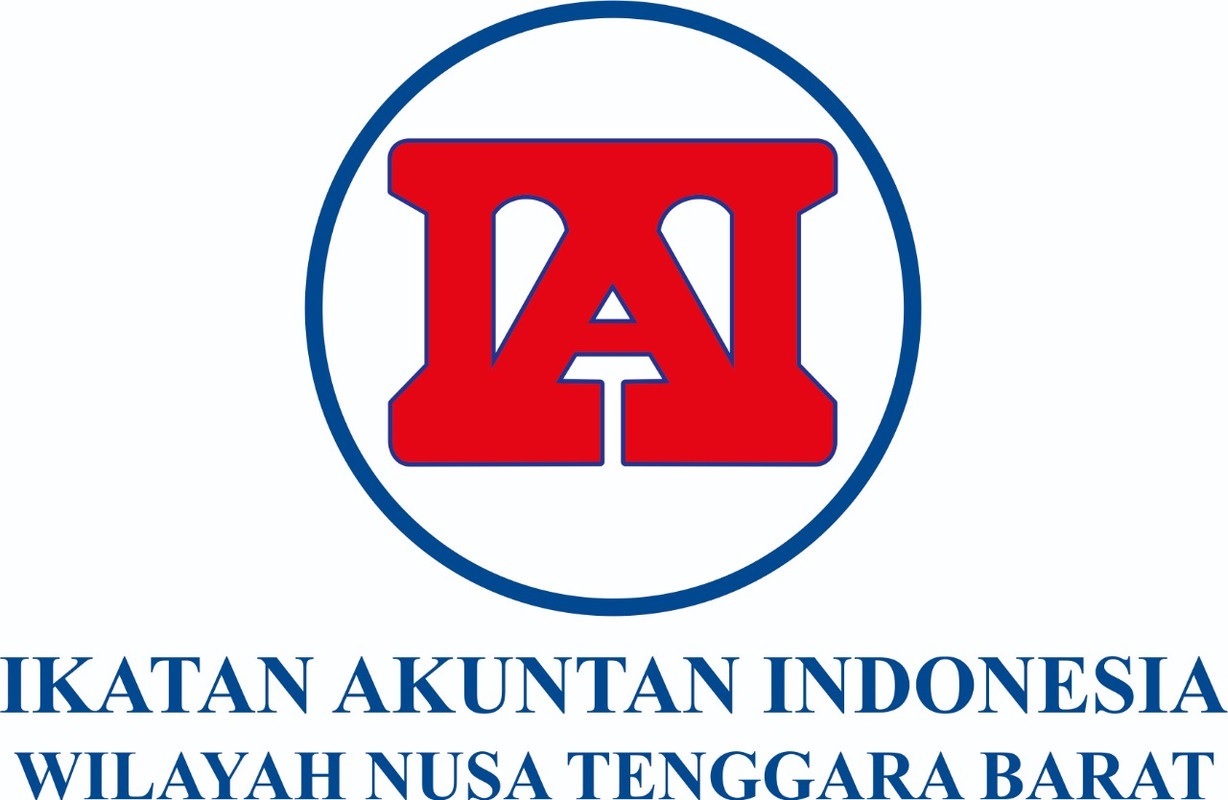KUALITAS PROSES AUDIT: TASK COMPLEXITY DAN LOCUS OF CONTROL DENGAN TABK SEBAGAI MODERASI
DOI:
https://doi.org/10.29303/jaa.v9i1.417Keywords:
Audit Process Quality, Task Complexity, Locus of Control, CAATsAbstract
The COVID-19 pandemic has driven significant transformations in audit practices, particularly through the shift towards remote auditing. The focus of this research is to examine the influence of Task Complexity and Locus of Control on Audit Process Quality with Computer-Assisted Audit Techniques (CAAT) as a moderating variable. This study employs a quantitative research method with primary data collection through questionnaires and Likert scales. The research sample consists of 100 auditors working in Public Accounting Firms in DKI Jakarta, selected using purposive sampling method. Data analysis is conducted using Structural Equation Modeling (SEM) through the SmartPLS 4.0 program with a significance level of 0.05. Findings indicate that Task Complexity has a significant negative impact on Audit Process Quality, while Internal Locus of Control has a significant positive influence. Conversely, External Locus of Control does not significantly affect Audit Process Quality. CAAT as a moderating variable weakens the relationship between Task Complexity and Audit Process Quality. However, CAAT does not strengthen the relationship between Internal Locus of Control and Audit Process Quality, and it does not influence the relationship between External Locus of Control and Audit Process Quality. The implications of this research lie in a more comprehensive understanding of components influencing audit process quality, contributing to the enhancement of audit practices in the digital era.
References
Ahmad, H. (2022). Effect of Task Complexity, Independence and Integrity on Internal Audit Quality. Advances in Auditing Research, 1(1), 23–34.
Amanda, R., Haliah, & Kusumawati, A. (2023). The Influence of Task Complexity, Self-Efficacy, and Audit Risk on Auditor Performance at Public Accounting Office (KAP) in Makasar City. Journal of Social Research, 2(6). http://ijsr.internationaljournallabs.com/index.php/ijsr
Ames, A. C., Haveroth, J., da Cunha, P. R., & Ié, P. (2022). Influence of Locus of control and Relating Occupational Stress to Audit Quality Reducing Practices. Contabilidade Vista & Revista., 33.
Andrian, F., Rahayu, S., Herawaty, N., & Rahayu, R. (2022). Pengaruh Locus of control, Emotional Quotient, Skeptisme dan Kompleksitas Tugas terhadap Kualitas Audit di KAP Kota Palembang. Jurnal Ilmiah Universitas Batanghari Jambi (JIUBJ), 22(3), 1350–1355. https://doi.org/10.33087/jiubj.v22i3.2449
Asmaah, S. (2023). Effects of Computer Assisted Audit Techniques on Quality of Internal Audit Reports in Kenya. African Journal of Commercial Studies, 3(1), 34–45. https://doi.org/10.59413/ajocs/v3.i1.2
Asniarti, & Muda, I. (2019). The Effect of Computer Assisted Audit Tools on Operational Review of Information Technology Audits. Advances in Social Science, Education and Humanities Reesearch (ASSEHR), 208. https://doi.org/10.2991/icssis-18.2019.5
Bong, M., Liawatimena, S., & Lindawati, A. (2021). Auditor’s Perception on Technology Transformation: Blockchain and CAATs on Audit Quality in Indonesia. International Journal of Advanced Computer Science and Applications, 12(8), 526–533. https://doi.org/10.14569/IJACSA.2021.0120861
Febrianto, N. I., & Kartikasari, L. (2024). Pengaruh Teknik Audit Berbantuan Komputer (TABK) terhadap Kualitas Audit dengan Prosedur Audit sebagai Variabel Moderasi. Jurnal Akuntansi Indonesia, 13, 54–66.
Ghozali, I. (2021). Partial Least Squares Konsep, Teknik, dan Aplikasi menggunakan Program SmartPLS 3.2.9 (Untuk Penelitian Empiris). Badan Penerbit Undip.
Gilbert, Monica, G. C., Fransisca, Y., & Sitepu, W. R. B. (2020). Due Professional Care, Kompleksitas Tugas, Ukuran Kantor Akuntan Publik, dan Kualitas Audit pada Kantor Akuntan Publik Medan. E-Jurnal Akuntansi, 30(12), 3189. https://doi.org/10.24843/eja.2020.v30.i12.p15
Gusman, R. V., & Challen, A. E. (2023). Pengaruh Audit Jarak Jauh, Teknik Audit Berbantuan Komputer, Kinerja Auditor, dan Locus of control Terhadap Kualitas Audit. Jurnal Akuntansi Neraca, 1.
Hair, J. F., Hult, G. T. M., Ringle, C. M., & Sarstedt, M. (2017). A Primer on Partial Least Squares Structural Equation Modeling (PLS-SEM). Thousand Oaks. Sage.
Hariani, S. (2019). Impact of Time Budget Pressure, Locus of control, Independence, Professional Skeptisism and Audit Judgement on Audit Quality in Indonesian. European Journal of Business and Management, 11(27). https://doi.org/10.7176/EJBM
IAPI. (2013). SA 315.pdf (p. 44).
IAPI. (2016). SA 300.pdf.
ICAI. (2020). ICAI Global Webinar: Impact of COVID-19 Pandemic on Reporting and Assurance. https://www.ifac.org/knowledge-gateway/developing-accountancy- profession/discussion/icai-global-webinar-impact-covid-19-pandemic- reporting-and-assurance
Institut Akuntan Publik Indonesia (IAPI). (2010). SA 330.pdf (pp. 323–344). http://www.iapi-lib.com/spap/1/files/SA 300-400/SA 330.pdf
Institut Akuntan Publik Indonesia (IAPI). (2012). Standar Audit (“SA”) 327: Teknik Audit Berbantuan Komputer. In Standar Profesional Akuntan Publik, PSA No. 59 (SA Seksi 327) (Issue 59, pp. 1–6).
Megayani, N. K., Suryandari, N. N. A., & Susandya, A. A. P. G. B. A. (2020). Pengaruh Independensi, Due Professional Care dan Locus of control Terhadap Kualitas Audit Dengan Pengalaman Auditor Sebagai Variabel Moderasi Pada KAP di Provinsi Bali. Jurnal Riset Akuntansi Dan Keuangan, 8(1), 133–150. https://doi.org/10.17509/jrak.v8i1.20671
Meiryani, Sujanto, M., Lindawati, A., Zulkarnain, A., & Liawatimena, S. (2021). Auditor’s Perception on Technology Transformation: Blockchain and CAATs on Audit Quality in Indonesia. In IJACSA) International Journal of Advanced Computer Science and Applications (Vol. 12, Issue 8). www.ijacsa.thesai.org
Melanie, J. R., & Darmastuti, D. (2023). Kompleksitas Tugas, Audit Fee, dan Kualitas Audit: Moderasi Diskriminasi Harga. EL MUHASABA: Jurnal Akuntansi (e-Journal), 14(2). https://doi.org/10.18860/em.v14i2.21110
Najmuddin, A. B., & Pamungkas, I. D. (2021). Pengaruh Independensi, Pengalaman, Penerapan Akuntansi Forensik Dan Teknik Audit Berbantuan Komputer (TABK) Terhadap Efektivitas Pelaksanaan Audit Investigatif Dalam Mendeteksi Kecurangan (Studi Kasus Pada BPKP Jawa Tengah). Proceeding SENDIU, 72(6), 978–979. https://www.unisbank.ac.id/ojs/index.php/sendi_u/article/view/8596
Nurbaiti, A., & Prakasa, E. (2022). Analisis Pengaruh Indepedensi, Task Complexity, dan Kompetensi Auditor Terhadap Kualitas Audit. Owner, 6(4), 3604–3615. https://doi.org/10.33395/owner.v6i4.1041
Octada, A. L. (2024). AAIS ( Audit Accounting Information System ) Sebagai Informasi Audit di Era Kemajuan Ekonomi Digital. Indonesian Journal of Auditing and Accounting, 1(1), 34–46.
Parluhutan, C. A., Ermawati, & Widyastuti, S. (2022). The Influence of Auditor Ethics, Auditor Motivation, Locus of control on Audit Quality: Role of Professional Skepticism. Universal Journal of Accounting and Finance, 10(1), 267–275. https://doi.org/10.13189/ujaf.2022.100127
Prabowo, D. D. B., & Suhartini, D. (2021). The Effect of Independence and Integrity on Audit Quality: Is There A Moderating Role for E-Audit? Journal of Economics, Business, & Accountancy Ventura, 23(3). https://doi.org/10.14414/jebav.v23i3.2348
Saleem, K. A. (2021). The Impact of the Coronavirus Pandemic on Auditing Quality in Jordan. In International Journal of Innovation, Creativity and Change. www.ijicc.net (Vol. 15). https://www.researchgate.net/publication/350132557
Sari, Y., & Kurniawati. (2021). Apakah Skeptisisme Profesional, Kompleksitas Tugas dan Teknik Audit Berbantuan Komputer Berdampak Terhadap Kualitas Audit? ULTIMA Accounting, 13(2), 238–256. 10.31937/akuntansi.v13i2.2221
Sugiyono. (2017). Metode Penelitian Kuantitatif Kualitatif dan R&D. Alfabeta.
Susanto, Y., Nuraini, B., Sutanta, Gunadi, Basri, A., Mulyadi, & Endri. (2020). The Effect of Task Complexity, Independence and Competence on the Quality of Audit Results with Auditor Integrity as a Moderating Variable. In International Journal of Innovation, Creativity and Change. www.ijicc.net (Vol. 12). https://ijicc.net/images/vol12/iss12/121268_Susanto_2020_E_R.pdf
Susilawati, N., & Munawarah, I. (2023). Faktor-Faktor Skeptisisme Profesional, Kompleksitas Tugas, dan Teknik Audit Berbantuan Komputer Berdampak Terhadap Peningkatan Kualitas Audit. ELESTE : Economics Learning Experience & Social Thinking Education Journal, 3(1).
Suwandi, E. D. (2021). Kualitas Audit Perusahaan Pada Masa Pandemic Covid 19 (Studi Literatur). In Jurnal Akuntansi Keuangan dan Bisnis (Vol. 14, Issue 1). https://jurnal.pcr.ac.id/index.php/jakb/
Suwantari, P. Y., & Adi, I. K. Y. (2020). Pengaruh Locus of control, Pengalaman, Skeptisme, Profesional, dan Time Budget Pressure terhadap Kualitas Audit pada Kantor Akuntan Publik di Bali. Journal Research Accounting (JARAC), 2.
Visiana, K. (2023). Pengaruh Kompleksitas Tugas dan Kompetensi Audit Terhadap Kualitas Audit dengan Integritas Auditor sebagai Variabel Moderating. In Journal Akuntansi Manajerial ISSN (E) (Vol. 8, Issue 1). http://journal.uta45jakarta.ac.id/index.php/JAM/index
Wardani, R. P., & Nugraheni, B. D. (2021). Implikasi Teknologi Informasi Terhadap Profesi Auditor Dalam Menghadapi Remote Audit. Media Mahardhika, 20(1), 148–157. https://doi.org/10.29062/mahardika.v20i1.330
Witjaksono, A., & Alfi, M. M. (2022). The Effect of Time Budget Pressure, Task Complexity and Professional Commitments on Reducing Audit Quality (RAQ) in Public Accountant Offices. Proceedings of the 7th North American International Conference on Industrial Engineering and Operations Management, Orlando, Florida, USA, 12–14. https://www.researchgate.net/publication/370944135
Zaleha, P. A., & Novita. (2020). Dampak Teknologi Informasi dan Etika Profesi terhadap Kinerja Auditor. Jurnal Akuntansi Dan Auditing, 17(1).
Downloads
Published
How to Cite
Issue
Section
License
Copyright (c) 2024 Jelita Frisca Elina, Dewi Darmastuti

This work is licensed under a Creative Commons Attribution-NonCommercial-ShareAlike 4.0 International License.









